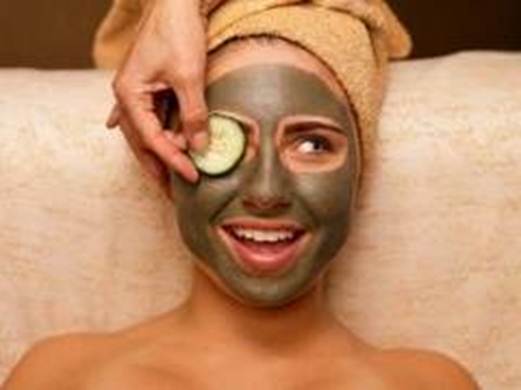The bad news: your anxiety over aging could
be causing wrinkles, zits, and blotchy spots. The good news: you can – and must
– relax

At The yoga class
The yoga class I'd signed up for to unwind
was doing just the trick-that is, until the instructor stopped in front of me
during corpse pose and told me to relax. "Try to cut the imaginary string
that's furrowing your brows together," she whispered. "You're getting
a stress wrinkle." Stress wrinkle? I wanted to tell this guru to namaste
out of my business, but I had a hunch she was right. It doesn't take a genius
to realize that the kind of stress that drives us to yoga class-or a third Diet
Coke or checking our e-mail from bed-isn't good for our skin, but it may be
more serious than we realize. "There are very few skin conditions that
stress doesn't exacerbate: among them dryness, acne, rosacea, eczema,
sensitivity, redness, and wrinkles," says Boston dermatologist Dr. Ranella
Hirsch. It may even play a role in the development of skin cancer, as suggested
by a 2005 National Cancer institute study in which stressed-out mice (who moved
my cheese?!) were less immune to the effects of UV light and so developed skin
cancer more rapidly than their nonstressed peers. If that isn't stressful
enough to consider, know that "in extreme cases, stress can even mess with
your hormones enough to cause villous hair growth," aka a layer of facial
peach fuzz, according to New York City derma-tologist Dr. Patricia Wexler.
The stress cycle
The way stress affects your skin is that
when you're tense, your brain releases cortisol, a stress hormone, into your
bloodstream. That tells oil glands to ramp up production, leading to breakouts.
Stress also dilates blood vessels, which causes redness and aggravates rosacea.
Another side effect is skin becomes dehydrated, sensitive, and more susceptible
to damage. Besides causing lines from furrowing your brow, stress also makes
you look markedly older. We already lose 1 percent of our skin's collagen
supply every year after we hit age 20, but stress can accelerate that.
"Younger women are coming into my office with wrinkles and older ones are
still fighting acne. These issues are caused in large part because patients are
more stressed out than they were even five years ago," says California
dermatologist Dr.Howard Murad. Some triggers are relationships, money, work,
and family, according to Hirsch, but Murad also sees a rise in "cultural
stress-the feeling that women expect perfection from themselves in all areas at
all times. We all know that stress is unhealthy for your heart and brain, but
it's just as bad for your skin." Repairing it works best with a
dual-pronged approach that incorporates internal and external fixes.

Skin-deep: topical solutions
Since stress marks everyone's skin
differently, the first step is to take note of how your face reacts during the
two weeks surrounding a high-stakes work presentation or a fight with your
sister.
Breakout busters
For those whose skin reacts with greasiness
and breakouts, the key is exfoliating to unclog pores that can harbor bacteria.
"Instead of a gritty scrub exfoliant, which can cause further redness, use
a product with lactic acid, which hydrates as it removes dead skin cells,"
says Baltimore dermatologist Dr. Noclle Sherber: "Then follow with an
oil-absorbing kaolin clay mask." (The Kinara Red Carpet Facial Kit
includes both steps.) Spot treat blemishes with a salicylic acid gel. But if
your acne comes with sensitivity and patches of dryness, the standard
over-the-counter routine won't benefit you as much as a trip to the derm's
office. In those cases, Wexler recommends Isolaz, an acne-fighting light
therapy, with a salicylic acid infusion to brighten skin and clear acne.
Another in-office treatment is an antioxidant-rich glycolic acid peel, such as
Vivite, paired with blue-light treatment. "The light waves kill
acne-promoting bacteria underneath the skin without causing dryness or irritation,"
says Sherber

For
those whose skin reacts with greasiness and breakouts, the key is exfoliating
to unclog pores that can harbor bacteria